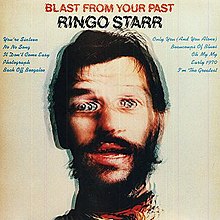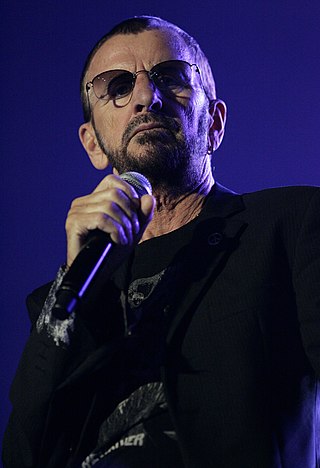
English musician Ringo Starr has released twenty studio albums and forty-six singles. Starr achieved international fame as a member of British rock band the Beatles.
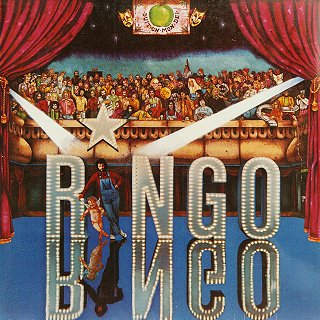
Ringo is the third studio album by English musician Ringo Starr, released in 1973 on Apple Records. It peaked at No. 7 on the UK Albums Chart and No. 2 on the Billboard 200 and has been certified platinum by the RIAA. In Canada, it reached No. 1 on the RPM national albums chart.

Beaucoups of Blues is the second studio album by the English rock musician and former Beatle Ringo Starr. It was released in September 1970, five months after his debut solo album, Sentimental Journey. Beaucoups of Blues is very far removed in style from its pop-based predecessor, relying on country and western influences. A longtime fan of the genre, Starr recorded the album over three days in Nashville with producer Pete Drake and an ensemble of local session players. Beaucoups of Blues failed to chart in Britain but achieved moderate commercial success in the United States, where it reached number 35 on Billboard's Country Albums list and number 65 on the Billboard Top LPs chart.

Goodnight Vienna is the fourth studio album by Ringo Starr. It was recorded in the summer of 1974 in Los Angeles, and released later that year. Goodnight Vienna followed the commercially successful predecessor Ringo, and Starr used many of the same players, including Billy Preston, Klaus Voormann, Robbie Robertson, Harry Nilsson, and producer Richard Perry. The title is a slang phrase meaning "it's all over".

"It Don't Come Easy" is a song by English rock musician Ringo Starr that was released as a non-album single in April 1971. It was produced by Starr's former Beatles bandmate George Harrison, who also helped write the song, although only Starr is credited. Recording for the track took place in March 1970 at Trident Studios in London, with overdubs added in October. Starr and Harrison performed the song together in August 1971 at Harrison's Concert for Bangladesh shows in New York City, a recording from which was released on the live album of the same name. Starr has continued to perform it in subsequent decades with his All-Starr Band.

Ringo the 4th is the sixth studio album by English musician Ringo Starr, released on 20 September 1977. Its title is sometimes ascribed to him being the fourth member of the Beatles. Others have suggested that it is his fourth mainstream album, which excludes his Great American Songbook homage, Sentimental Journey, and his country-western foray, Beaucoups of Blues. However, Ringo the 4th is a dance-oriented record, crafted for him by his Atlantic Records producer, Arif Mardin.
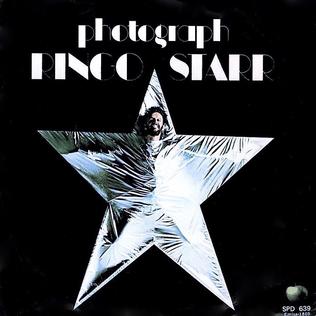
"Photograph" is a song by English rock musician Ringo Starr that was released as the lead single from his 1973 album Ringo. Starr co-wrote it with George Harrison, his former bandmate from the Beatles. Although they collaborated on other songs, it is the only one officially credited to the pair. A signature tune for Starr as a solo artist, "Photograph" was an international hit, topping singles charts in the United States, Canada and Australia, and receiving gold disc certification for US sales of 1 million. Music critics have similarly received the song favourably; Stephen Thomas Erlewine of AllMusic considers it to be "among the very best post-Beatles songs by any of the Fab Four".

The Best of George Harrison is a 1976 compilation album by English musician George Harrison, released following the expiration of his EMI-affiliated Apple Records contract. Uniquely among all of the four Beatles' solo releases, apart from posthumous compilations, it mixes a selection of the artist's songs recorded with the Beatles on one side, and later hits recorded under his own name on the other.

Bad Boy is the seventh studio album by English rock musician Ringo Starr, released in 1978 by Polydor Records. The album was released at a time of diminishing success for Starr, failing to chart in the UK and reaching only No. 129 in the US and No. 98 in Australia, with none of its singles charting in either the UK or US. Prior to its release in the US, it was cross-promoted with the TV special Ringo, which was poorly received, and a planned follow-up special never came to fruition. Bad Boy would ultimately be Starr's final album release for Polydor.

Stop and Smell the Roses is the eighth studio album by English rock musician Ringo Starr. Released in October 1981, it followed the twin commercial failures of Ringo the 4th (1977) and Bad Boy (1978). The album includes the hit single "Wrack My Brain", written and produced by George Harrison, but otherwise failed to find commercial success. It also includes contributions from Paul McCartney, Harry Nilsson, Ronnie Wood and Stephen Stills.
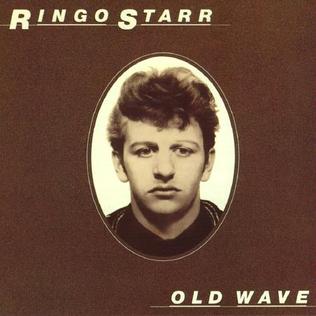
Old Wave is the ninth studio album by English rock musician Ringo Starr. It was originally released in June 1983, on the label Bellaphon, and is the two-year follow-up to his 1981 album Stop and Smell the Roses. The title is a play on new wave music.

Ringo Starr and His All-Starr Band is Ringo Starr's first official live album, and the first album recorded with his All-Starr Band, recorded in 1989 during his successful comeback tour and released in 1990. It was also Starr's first release of unheard material in seven years.

Ringo Starr and His All Starr Band Volume 2: Live from Montreux is Ringo Starr's second official live album and was released in September 1993.
"I'm the Greatest" is a song written by English musician John Lennon that was released as the opening track of the 1973 album Ringo by Ringo Starr. With Starr, Lennon and George Harrison appearing on the track, it marks the only time that three former Beatles recorded together between the band's break-up in 1970 and Lennon's death in 1980. Lennon wrote the song in December 1970 as a wry comment on his rise to fame, and later tailored the lyrics for Starr to sing. Named after one of Muhammad Ali's catchphrases, the song partly evokes the stage-show concept of the Beatles' 1967 album Sgt. Pepper's Lonely Hearts Club Band.

"Beaucoups of Blues" is the title song from Ringo Starr's 1970 country album of the same name. It was released as Starr's first solo single on 5 October 1970 on Apple in several countries, but not the UK, and entered the charts in both the US and Germany where it reached number 87 and number 43 respectively. The song was written by Nashville singer-songwriter Buzz Rabin, and appeared on his 1974 solo album Cross Country Cowboy.

"Back Off Boogaloo" is a song by English rock musician Ringo Starr that was released as a non-album single in March 1972. Starr's former Beatles bandmate George Harrison produced the recording and helped Starr write the song, although he remained uncredited as a co-writer until 2017. Recording took place in London shortly after the pair had appeared together at Harrison's Concert for Bangladesh shows in August 1971. The single was a follow-up to Starr's 1971 hit song "It Don't Come Easy" and continued his successful run as a solo artist. "Back Off Boogaloo" peaked at number 2 in Britain and Canada, and number 9 on America's Billboard Hot 100. It remains Starr's highest-charting single in the United Kingdom.
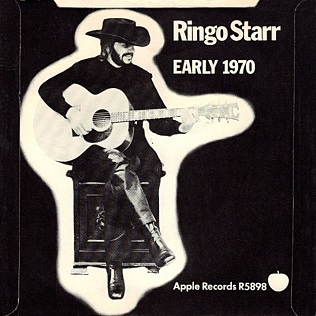
"Early 1970" is a song by English rock musician Ringo Starr that was released as the B-side of his April 1971 single "It Don't Come Easy". A rare example of Starr's songwriting at the time, it was inspired by the break-up of the Beatles and documents his relationship with his three former bandmates. The lyrics to the verses comment in turn on Paul McCartney, John Lennon and George Harrison as individuals, and the likelihood of each of them making music with Starr again. In the final verse, Starr offers a self-deprecating picture of his musical abilities and expresses the hope that all four will play together in the future. Commentators have variously described "Early 1970" as "a rough draft of a peace treaty" and "a disarming open letter" from Starr to Lennon, McCartney and Harrison.
"Six O'Clock" is a song by English rock musician Ringo Starr from his 1973 album Ringo. It was written by Starr's former Beatles bandmate Paul McCartney and the latter's wife, Linda, who also participated in the recording of the song. It was the first time McCartney and Starr had worked together since the Beatles' break-up in 1970. Their collaboration reflected an easing of the tensions that had existed between the two musicians for much of that period.
Ring O' Records was a record label founded by former Beatle Ringo Starr in 1975. The label's formation coincided with the winding down of the Beatles' Apple Records and allowed Starr to continue supporting other artists' projects while maintaining his solo career. The label was shut down in 1978, having failed to achieve commercial success with a roster of artists that included David Hentschel, Bobby Keys, Graham Bonnet and Rab Noakes. Starr himself never recorded for Ring O' Records, although, following the expiration of his contract with Apple in January 1976, he signed with Polydor, which distributed his label throughout Europe. From 1977, Ring O' was distributed in some territories by Mercury Records.

The Singles Collection 1962–1970 is a series of reissued singles by the English rock band the Beatles. It was released in Britain on 5 March 1976 by EMI, following the expiration of the Beatles' contract with the company in January, and close to six years after the band's break-up. The collection comprises all 22 of the Beatles' UK singles, which were originally issued between October 1962 and March 1970 on either the Parlophone or Apple record labels, together with a new single pairing "Yesterday" with "I Should Have Known Better".
